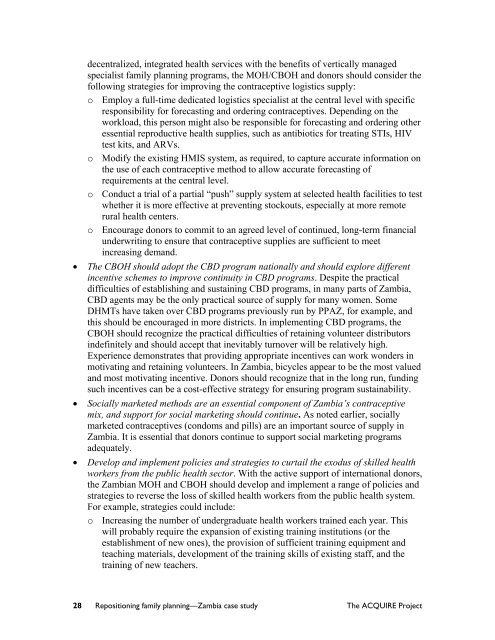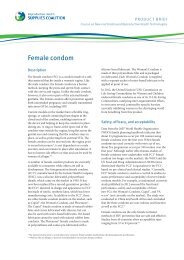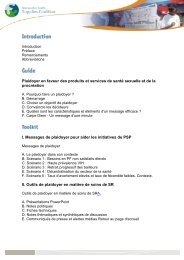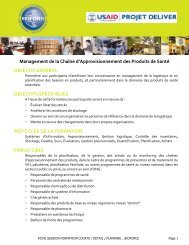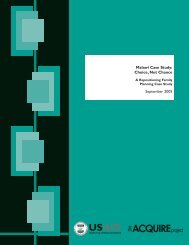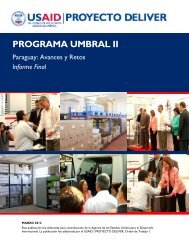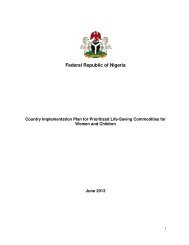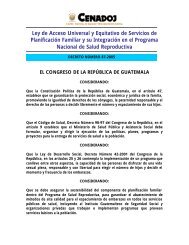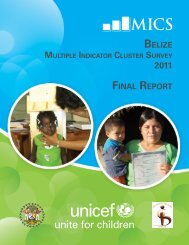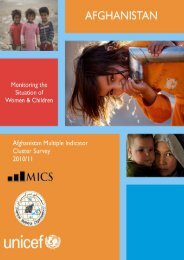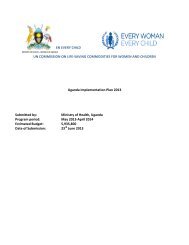Zambia Case Study: Ready for Change - Reproductive Health ...
Zambia Case Study: Ready for Change - Reproductive Health ...
Zambia Case Study: Ready for Change - Reproductive Health ...
You also want an ePaper? Increase the reach of your titles
YUMPU automatically turns print PDFs into web optimized ePapers that Google loves.
decentralized, integrated health services with the benefits of vertically managed<br />
specialist family planning programs, the MOH/CBOH and donors should consider the<br />
following strategies <strong>for</strong> improving the contraceptive logistics supply:<br />
o Employ a full-time dedicated logistics specialist at the central level with specific<br />
responsibility <strong>for</strong> <strong>for</strong>ecasting and ordering contraceptives. Depending on the<br />
workload, this person might also be responsible <strong>for</strong> <strong>for</strong>ecasting and ordering other<br />
essential reproductive health supplies, such as antibiotics <strong>for</strong> treating STIs, HIV<br />
test kits, and ARVs.<br />
o Modify the existing HMIS system, as required, to capture accurate in<strong>for</strong>mation on<br />
the use of each contraceptive method to allow accurate <strong>for</strong>ecasting of<br />
requirements at the central level.<br />
o Conduct a trial of a partial “push” supply system at selected health facilities to test<br />
whether it is more effective at preventing stockouts, especially at more remote<br />
rural health centers.<br />
o Encourage donors to commit to an agreed level of continued, long-term financial<br />
underwriting to ensure that contraceptive supplies are sufficient to meet<br />
increasing demand.<br />
• The CBOH should adopt the CBD program nationally and should explore different<br />
incentive schemes to improve continuity in CBD programs. Despite the practical<br />
difficulties of establishing and sustaining CBD programs, in many parts of <strong>Zambia</strong>,<br />
CBD agents may be the only practical source of supply <strong>for</strong> many women. Some<br />
DHMTs have taken over CBD programs previously run by PPAZ, <strong>for</strong> example, and<br />
this should be encouraged in more districts. In implementing CBD programs, the<br />
CBOH should recognize the practical difficulties of retaining volunteer distributors<br />
indefinitely and should accept that inevitably turnover will be relatively high.<br />
Experience demonstrates that providing appropriate incentives can work wonders in<br />
motivating and retaining volunteers. In <strong>Zambia</strong>, bicycles appear to be the most valued<br />
and most motivating incentive. Donors should recognize that in the long run, funding<br />
such incentives can be a cost-effective strategy <strong>for</strong> ensuring program sustainability.<br />
• Socially marketed methods are an essential component of <strong>Zambia</strong>’s contraceptive<br />
mix, and support <strong>for</strong> social marketing should continue. As noted earlier, socially<br />
marketed contraceptives (condoms and pills) are an important source of supply in<br />
<strong>Zambia</strong>. It is essential that donors continue to support social marketing programs<br />
adequately.<br />
• Develop and implement policies and strategies to curtail the exodus of skilled health<br />
workers from the public health sector. With the active support of international donors,<br />
the <strong>Zambia</strong>n MOH and CBOH should develop and implement a range of policies and<br />
strategies to reverse the loss of skilled health workers from the public health system.<br />
For example, strategies could include:<br />
o Increasing the number of undergraduate health workers trained each year. This<br />
will probably require the expansion of existing training institutions (or the<br />
establishment of new ones), the provision of sufficient training equipment and<br />
teaching materials, development of the training skills of existing staff, and the<br />
training of new teachers.<br />
28 Repositioning family planning—<strong>Zambia</strong> case study The ACQUIRE Project


